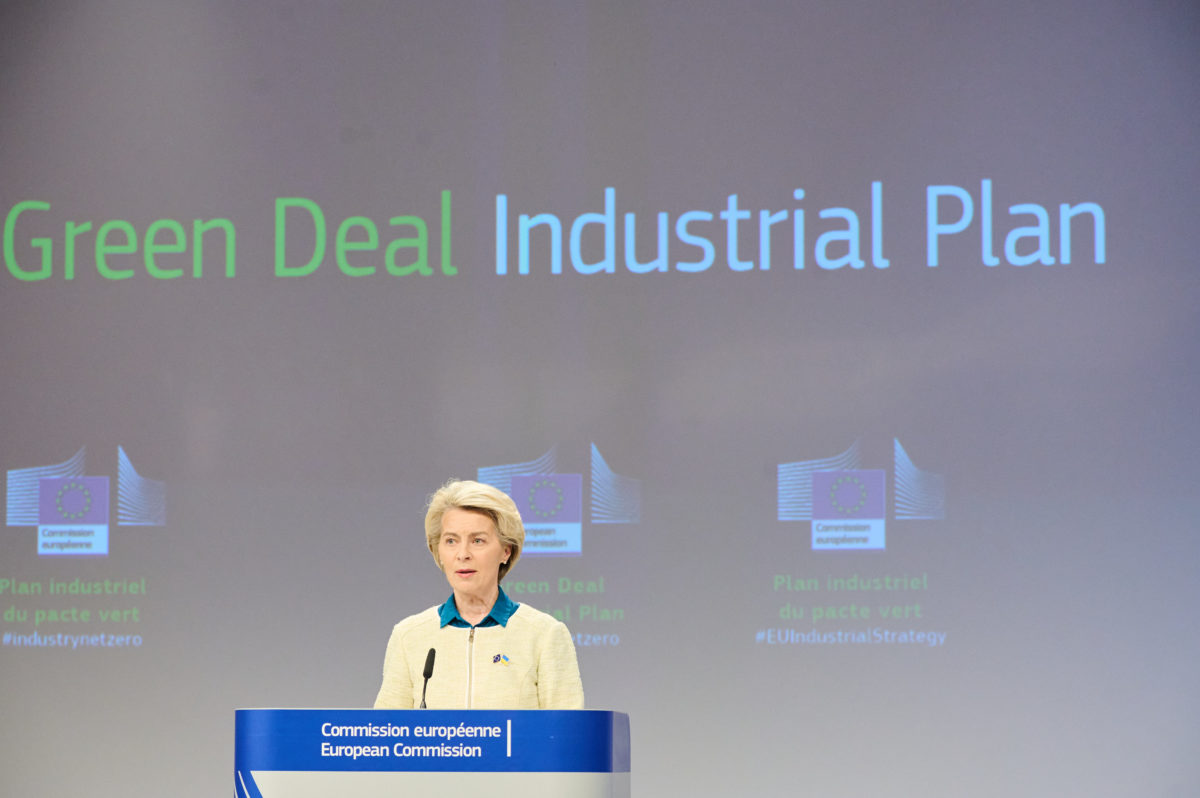
The European Union unveiled the “Green Deal Industrial Plan” on February 1 in an effort to support and expand its green sector. The plan intends to remove red tape and provide huge subsidies. The move comes just a few months after the US revealed its Inflation Reduction Act (IRA), which includes billions of dollars in tax breaks for clean energy and climate change programs, as well as incentives for US-based manufacturing.
Speaking to the media, Ursula von der Leyen, president of the European Commission, said, “We have a once-in-a-generation opportunity to show the way with speed, ambition, and a sense of purpose of securing the European Union’s industrial lead in the fast-growing net-zero technology sector. Europe is determined to lead the clean tech revolution.”
The initiative will be discussed by European Union leaders during a summit next week, according to DW. The plan must be approved by the 27 national governments before it can be implemented.
What exactly is the “Green Deal Industrial Plan”?
According to the European Commission’s website, which supervises European Union trade policy, the idea includes creating a clearer regulatory environment, enabling speedier access to funding, increasing skills, and expanding the EU’s trade network.
Simpler regulatory framework
The initiative aims to draft a “Net-Zero Industry Act,” which will not only simplify laws but also accelerate the issue of permits for green projects including renewable energy generation arrays, carbon capture, and renewable hydrogen manufacturing facilities.
It also includes a “Critical Raw Materials Act,” which will provide access to materials such as rare earth, which are critical in the development of net-zero technologies.
Providing faster access to funds
State aid laws will be relaxed, according to the plan, to assist the EU’s 27 states in investing in sustainable energy projects.
Given that not every country has the huge means of France or Germany to provide subsidies to businesses, the plan allows governments to take money from existing European Union funds.
Notably, the idea does not entail a new crash and instead intends to allocate €250 billion from existing European Union funds, which total over €800 billion, to the green industry.
There is also a possibility for establishing a “European Sovereignty Fund” in the future to “give a structural answer to the investment needs”.
Enhancing skills
The plan calls for the establishment of “Net-Zero Industry Academies,” which will offer up-skilling and re-skilling programs in important areas. According to the European Commission’s website, the green transition could disrupt 30-40% of existing jobs. As a result, the “Green Deal Industrial Plan” focuses on building skills required for well-paying, high-quality jobs.
Improving the Trade Network
The strategy emphasizes the importance of open commerce and aims to “further develop the European Union ’s network of Free Trade Agreements and other forms of cooperation with partners to support the green transition.”
According to Reuters, the European Commission seeks to strike trade arrangements with “like-minded partners” for raw materials and sustainable technology.
Counter to the USA’s Inflation Reduction Act (IRA)
President Joe Biden’s government will propose climate change legislation in August 2022, allocating $390 billion to sustainable energy initiatives. Customers and manufacturers benefit greatly from the IRA’s tax benefits and incentives. However, immediately after the legislation was published, European Union leaders expressed reservations about its potentially “discriminatory” aspects.
The European Union members have warned that the IRA’s tax incentives and subsidies to green goods manufacturers will disadvantage European enterprises and entice them to relocate to the United States. In a speech in November 2022, EU Trade Commissioner Valdis Dombrovskis stated, “The IRA contains clear discriminatory elements, which would hurt EU companies and their possibilities to export to the US, as well as our capacity to compete fairly with U.S. products on third country markets.”
As a result, it was not surprising when the bloc revealed its own plan to provide subsidies to sustainable businesses.
Although analysts have praised the European Union for recognizing the need to address Europe’s “worsening” competitiveness, some are concerned that the IRA and the new “Green Deal Industrial Plan” may spark a global subsidy war.
According to a recent Wall Street Journal report, “Some economists and policymakers warn that wide-ranging government support such as contained in the act isn’t always effective and doesn’t necessarily create the strong industries it is supposed to.”
